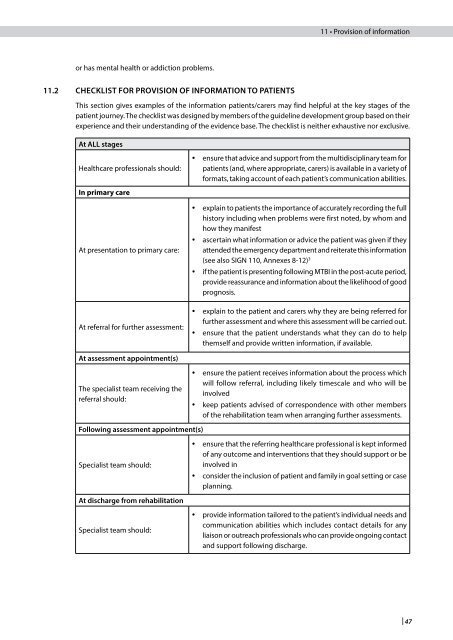sign130
sign130
sign130
Create successful ePaper yourself
Turn your PDF publications into a flip-book with our unique Google optimized e-Paper software.
or has mental health or addiction problems.<br />
11.2 CHECKlIST foR PRoVISIoN of INfoRMATIoN To PATIENTS<br />
This section gives examples of the information patients/carers may find helpful at the key stages of the<br />
patient journey. The checklist was designed by members of the guideline development group based on their<br />
experience and their understanding of the evidence base. The checklist is neither exhaustive nor exclusive.<br />
At All stages<br />
Healthcare professionals should:<br />
In primary care<br />
At presentation to primary care:<br />
At referral for further assessment:<br />
At assessment appointment(s)<br />
The specialist team receiving the<br />
referral should:<br />
following assessment appointment(s)<br />
Specialist team should:<br />
At discharge from rehabilitation<br />
Specialist team should:<br />
11 • Provision of information<br />
y ensure that advice and support from the multidisciplinary team for<br />
patients (and, where appropriate, carers) is available in a variety of<br />
formats, taking account of each patient’s communication abilities.<br />
y explain to patients the importance of accurately recording the full<br />
history including when problems were first noted, by whom and<br />
how they manifest<br />
y ascertain what information or advice the patient was given if they<br />
attended the emergency department and reiterate this information<br />
(see also SIGN 110, Annexes 8-12) 3<br />
y if the patient is presenting following MTBI in the post-acute period,<br />
provide reassurance and information about the likelihood of good<br />
prognosis.<br />
y explain to the patient and carers why they are being referred for<br />
further assessment and where this assessment will be carried out.<br />
y ensure that the patient understands what they can do to help<br />
themself and provide written information, if available.<br />
y ensure the patient receives information about the process which<br />
will follow referral, including likely timescale and who will be<br />
involved<br />
y keep patients advised of correspondence with other members<br />
of the rehabilitation team when arranging further assessments.<br />
y ensure that the referring healthcare professional is kept informed<br />
of any outcome and interventions that they should support or be<br />
involved in<br />
y consider the inclusion of patient and family in goal setting or case<br />
planning.<br />
y provide information tailored to the patient’s individual needs and<br />
communication abilities which includes contact details for any<br />
liaison or outreach professionals who can provide ongoing contact<br />
and support following discharge.<br />
| 47


